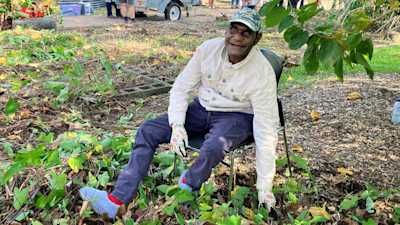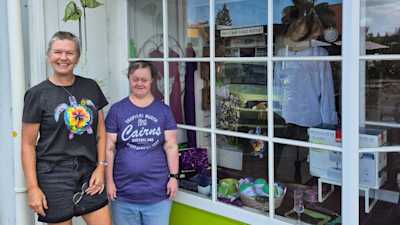"Giving people chances and opportunities empowers them,” Dennis.

Image: Debra, Regional Director VDAS North East, and Dennis sit at the Life Without Barriers' booth at the 2024 Having a Say conference.
Dennis is based in Melbourne, Victoria, and the home he lives in uses Life Without Barriers’ Supported Independent Living services. We sat down with Dennis to talk about the importance of people with disability being supported to share their opinions. The following story is of Dennis' experience and in his own words.
“Back in the olden days, people with disabilities were discarded or locked away in institutions. These days, people are more open to ideas and suggestions from people with disability." Dennis said.
"Things have changed a lot from the past to now, there is a bit more acceptance around people’s mental health and disability. And even though I say mental health and disability, they are both different topic areas."
"Every one goes through these things, they might not realise it – but sooner or later in life - they will have to deal with either some type of mental health, or disability.”
“I think it is important to have a say and advocate for people who can’t speak up for themselves, or don’t have the ability to address anything they want to bring up or talk about. It gives people a bit of independence and empowers people with disability to be part of a bigger community.”
“Many people don’t know, or don’t really have that ability to speak up for themselves. There are people who work at VALiD, and at Life Without Barriers, people who actually try to help and support people with disability if there are any issues or things that people want support with." Dennis shared.
Dennis is a member of Life Without Barriers’ Speak Up For Yourself (SUFY) group. SUFY is a self-advocacy group for people who live in Melbourne and use Life Without Barriers support services. The group is co-facilitated by VALiD, Victoria’s peak advocacy organisation for adults with intellectual disability.
“SUFY is a group that represents people with disability to talk and discuss problems and learn about topics or things that might be brought up in the focus group. I go to the Northeast SUFY group in Bundoora, up the back of Uni Hill,” Dennis continued.
“What happens in the group is that we come together, we go through a PowerPoint presentation that is laid out by Anthony from VALiD."
"We talk about topics that people want to talk about and know about - any harassment, all the disabilities, relationships, and topics around safety. We talk about public transport, OH&S, a bit about law."
"All your human rights - what you can do, and how to go about standing up and speaking up for yourself. And what’s right and what’s wrong. How staff are running things in your house, if you are happy with them or not. Who to turn to if anything happens or if you have a complaint."
"It is ok to speak up and to advocate for people who can’t speak up for themselves,” Dennis said.
“Sometimes, we have guest speakers come in and they do a talk and we answer or ask questions. For instance, last year we had people come in to talk about the Australian Electoral Commission and about how to vote. At the end of the session, we have someone that takes notes, minutes, so we can go back over topics from the previous meeting,” he said.
Dennis encourages other people with disability to take an active role in making decisions about their own lives and build their ability to independently accomplish their goals.
“Families are not always going to be there for you, the support you have may not always be there. Therefore, you have to learn and be educated in speaking up for yourself and having a say, so that you can represent yourself."
"You have to be independent and learn those things, and how to make small decisions or big decisions in life.”
Dennis believes that in the future, people with disability will have more choice and control in their lives.
“There’s always things to expand on and improve, as everything is a learning curve. The thing is, nothing is impossible. It all depends on the individual and how much work that individual wants to put in to become independent and to gain the ability to do things to maintain a better and/or longer life, to reach a goal, or achieve greater outcomes in their lives.”

Image: Robert is wearing a red t-shirt and is hugging Debra. Dennis is sitting on the right in a checkered shirt and brimmed hat. They are at a Life Without Barriers booth with a brick wall behind them.
Dennis spoke about what supports he recommends for people with disability to have more autonomy in their lives.
“Support workers should improve the ability of people with a disability to have more control over their life and do things independently.”
“People with disabilities need support by being educated and knowing right from wrong, and how to ask for things in life to make your life worthwhile – like living your best life for your abilities and dealing with things you have to deal with every day."
"Empowering the person to feel like they have accomplished something, like a goal. Teaching people life skills around being independent and being able to look after yourself.”
"People can do things you wouldn’t expect when they are given the chance or opportunities to do those things."
"Giving people chances and opportunities empowers them.”
As to having a say in his own life, Dennis has lots of thoughts about things he wants to do and services that can improve the social life of people with disability, including an app he is working on. He is speaking with Life Without Barriers staff about his ideas.
He’s also happy with the Life Without Barriers services he uses.
“I’m happy with the people in my house who support me. As a provider, Life Without Barriers do their best to cater to everyone’s individual disability needs and try to improve everything. They have been very supportive in looking after us in our independent living house,” Dennis said.
Life Without Barriers recognises that people are the experts in their own lives. That is why we have co-designed with the people with disability a statement about what rights mean to you, and how Life Without Barriers must protect your rights. Put simply, this means for the people we support ‘nothing about me, without me’.


